
How to Write a Good Support Worker CV
If you're interested in pursuing a career as a support worker in the UK, you're in the right place. The role of support workers continues to be essential within the healthcare and social care sectors in the UK, offering individuals the opportunity to make a real difference in the lives of others.
With an ever-evolving landscape and the integration of technology, particularly Artificial Intelligence (AI), there's more support than ever to help you succeed in securing your next role. In fact, AI CV writing tools are increasingly being used to create tailored CVs, optimise keywords, and improve your chances of passing through Applicant Tracking Systems (ATS).
Let CVMaker guide you through the CV writing process, offering a professional CV template to highlight your strengths.
Create an industry-standard CV
Choose a professional CV template
Easy to edit in the CV builder
Integrated spelling and grammar check
Customisable industry-specific CV examples
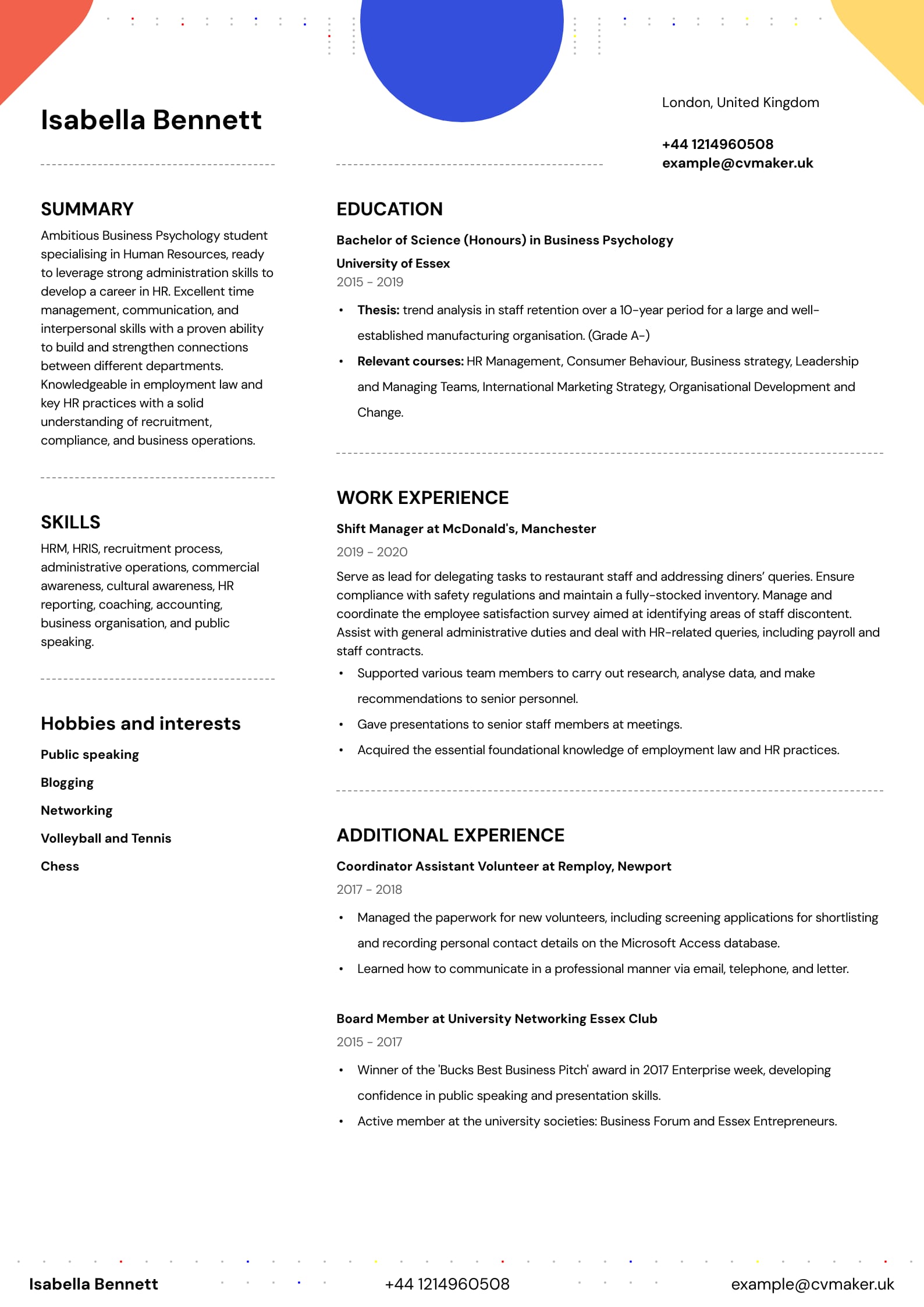
Whether you're just starting out, newly qualified, or an experienced support worker seeking a change, this CV writing guide has got you covered. We've compiled a comprehensive support worker CV example that aligns with the health and social care landscape.
Types of roles in the support worker space
Support work is a broad field, offering a variety of roles that cater to different needs and settings. Below are some common roles within this space, along with specific CV examples to help you target the right position for your skills and interests:
Entry-level support worker: If you're new to the industry, this entry-level position is an excellent starting point. Focus on transferable skills such as communication, empathy, and teamwork. For example, CVs for entry-level support workers typically highlight personal qualities and a willingness to learn.
Healthcare assistant: As a healthcare assistant, you’ll assist with daily living activities and support individuals in health settings. A CV for this role should highlight medical knowledge, care skills, and understanding of patient confidentiality.
Mental health support worker: These professionals work with individuals with mental health conditions. Your CV should emphasise empathy, communication skills, and knowledge of mental health conditions. Experience in crisis intervention or therapeutic practices is also beneficial.
Community support worker: Community support workers assist people in their homes or local communities. Your CV should showcase your ability to build relationships and provide support in diverse community settings, including with vulnerable or at-risk groups.
Youth support worker: Working with young people, often in challenging circumstances, requires patience, understanding, and a commitment to their development. Your CV should highlight experience working with youth and qualifications in child development or safeguarding.
Clinical support worker: These professionals support healthcare teams in clinical environments, helping with patient care, administration, and other duties. Your CV should focus on relevant clinical knowledge, technical skills, and any healthcare-related certifications you hold.
Maternity support worker: If you’re interested in working with expectant mothers and newborns, this role involves supporting midwives and healthcare professionals in providing care during pregnancy and post-birth. Highlighting experience in maternal health, newborn care, and assisting in birth preparation can set your CV apart.

Support Worker CV example


Interested in a cover letter? See the matching support worker cover letter.
What to include in a support worker CV?
Creating a CV for a support worker can feel overwhelming, especially if you’re new to the field. But don’t worry! Whether you’re looking for tips on writing a CV for your first job or updating your CV for a promotion, a modern CV effectively showcases your expertise.
Personal profile (summary): Write a brief summary highlighting your compassion, reliability, and ability to support individuals with diverse needs. Additionally, ensure that the personal details on your CV are always up to date.
Skills: Emphasise your strengths in communication, patience, problem-solving, and knowledge of safeguarding and health and safety procedures. For more tips, refer to the top skills employers are looking for.
Work experience: Include roles that demonstrate your experience providing care, assisting with daily tasks, and fostering clients' independence.
Education and certifications: Mention relevant support worker qualifications such as NVQs in Health and Social Care or first aid or mental health awareness certifications.
Must-have CV sections
Personal profile
Skills section
Work experience
Education
Learn more about how to write a good CV.
Refer to the caregiver CV or counsellor CV examples for more tips.
1. Support worker CV summary
To craft a strong personal profile, you need to highlight your unique soft skills and experience that make you an ideal candidate. Begin by briefly summarising your professional background, emphasising relevant qualifications or certifications. Below are examples of various levels of support workers:
Senior Support Worker CV personal profile example
Established Support Worker with over 10 years of experience in crisis intervention, hospital treatments, and supporting children with learning and developmental disabilities. Adept at building relationships with clients and their families with natural ability to be approachable and empathetic.
Mid-level Support Worker CV personal profile example
Compassionate and flexible Support Worker with 4 years of experience developing and following personal care plans for mental health patients. Skilled in managing challenging caseloads while maintaining positive communication with clients, families, staff, and visitors.
Junior Support Worker CV personal profile example
Entry-level Support Worker with 6 months of experience at the NHS, skilled in scheduling appointments, patient registration, and maintaining a clean and safe environment. Committed to providing exceptional care and support while working collaboratively with other healthcare professionals.
Mental Health Support Worker CV personal profile example
Experienced Mental Health Support Professional, boasting 6 years of service at the NHS. Proven expertise in efficiently managing complex tasks such as appointment scheduling, patient registration, and ensuring a secure and sanitised environment. Dedicated to delivering superlative care with a wealth of experience collaborating seamlessly with interdisciplinary healthcare teams.
Care Worker CV personal profile example
Experienced Care Worker with a decade of diverse healthcare expertise, excelling in daily living support, medication administration, and creating supportive environments. Proven collaborator with healthcare professionals, optimising client well-being through effective teamwork. Compassionate and patient-centred approach fosters meaningful connections with those in my care.
Family support worker CV personal profile example
Compassionate and experienced Family Support Worker with over 3 years in the healthcare and care sectors, supporting individuals and families through a wide range of challenges. Skilled in promoting emotional well-being, assisting with daily living needs, and coordinating with healthcare professionals to deliver tailored, holistic support. Known for building trusting relationships with families, offering guidance, and creating safe, nurturing environments. Patient, empathetic, and solutions-focused — committed to helping families overcome obstacles and thrive.
Refer to our social worker, healthcare or care assistant CV example for more related tips.
2. Support worker skills to add on a CV
To distinguish yourself as a strong candidate for a support worker role, you must showcase your soft and hard skills on your CV. While identifying and emphasising these skills may be difficult, evaluating your strengths and pinpointing your core skills can significantly enhance your CV.

Examples of support worker skills you can consider adding to your CV:
Communication: strong verbal and written skills, active listening, and non-verbal communication to understand and support clients effectively.
Empathy and compassion: ability to build trust, demonstrate emotional intelligence, and show care for clients' well-being.
Problem-solving: critical thinking, adaptability, and effective decision-making in challenging situations.
Teamwork: collaborating with multidisciplinary teams and resolving conflicts to ensure holistic care.
Time management: organising tasks and managing multiple clients while meeting deadlines.
Cultural competence: respecting and adapting care approaches to clients' diverse cultural and personal backgrounds.
Mental health awareness: understanding mental health conditions and providing crisis intervention and support.
Personal care assistance: helping clients with daily activities and monitoring their health.
Documentation: maintaining accurate, confidential client records and generating reports.
Patience and resilience: staying calm in challenging situations and practising self-care to maintain emotional well-being.
First aid and health & safety: knowledge of basic first aid and ensuring a safe environment for clients.
IT skills: proficiency in care management software and basic office applications for administrative tasks.
Legal and ethical understanding: knowledge of confidentiality, safeguarding, and advocacy for client rights.
Specialised training: relevant certifications and experience in areas such as mental health, dementia care, or autism.
For more information, refer to our article on what skills to put on your CV.
3. Work experience on a support worker CV
Your work experience is the backbone of your CV, giving potential employers insight into how you've applied your skills in previous roles. To showcase your abilities as a support worker, it's essential to detail your work experience, starting with your most recent job. Make sure to include your job title, employer's name and location, and the dates of your employment.
What should each work experience entry include?
Job title of current or previous role
Organisation name and location
Dates of employment (month/year)
A concise paragraph detailing your duties
Followed by 2–3 bullet points that highlight your key achievements or measurable impact.
Learn more about the work experience section in a CV.
Entry-level support worker CV example
Junior Support Worker, Care Services, London | 2023 – Present
Provide compassionate, person-centred support to individuals with learning disabilities and physical disabilities in a residential care setting. Assist with daily activities, including personal care, meal preparation, and household tasks, ensuring the health and well-being of clients. Promote independence and encourage clients to engage in social, recreational, and community activities. Maintain accurate records of care provided, adhering to confidentiality and safeguarding protocols.
Assisted in developing a personalized activity plan for a client with autism, leading to improved social engagement and increased independence.
Received a staff recognition award for consistently providing exceptional care, demonstrating dedication to residents' well-being.
Mental health support worker CV example
Mental Health Support Worker, Greenwood Mental Health Services, Manchester | 2021 – Present
Provide therapeutic support to individuals with mental health conditions, helping them to manage symptoms and improve daily functioning. Assist clients with setting personal goals, developing coping strategies, and engaging in community-based activities. Offer crisis intervention and emotional support during high-stress situations, ensuring clients' safety and well-being. Document client progress and communicate with healthcare professionals to ensure integrated care plans are followed.
Successfully supported 10+ clients in completing personalised recovery plans, leading to measurable improvements in mental health and stability.
Delivered a series of educational workshops on stress management, attended by over 50 clients, resulting in increased client engagement and skill-building.
Clinical support worker CV example
Clinical Support Worker, Willowbrook Medical Centre, Leeds | 2021 – Present
Assist clinical staff in providing care to patients in a busy medical centre, including preparing examination rooms and assisting with minor procedures. Take patient histories, measure vital signs, and assist with lab tests and diagnostic procedures. Provide pre- and post-operative care to patients, ensuring comfort and safety during recovery. Maintain patient records and assist with the organisation of medical supplies and equipment.
Recognised for improving patient flow by efficiently managing room setups, resulting in a 20% increase in the clinic’s capacity for same-day appointments.
Played a pivotal role in a project that reduced the time spent on patient intake procedures by 15%, improving overall clinic efficiency.
Refer to our guide on how to write the work experience on a CV for more information.
How to include additional experience on your support worker CV
If you have little to no work experience in the support worker field, don't worry. There are still ways to showcase your skills and qualifications on your CV. One way is to gain experience through placements and apprenticeships.
Placements can be done during college or in between semesters. It shows employers that you're dedicated to gaining experience and willing to work in your free time.
Apprenticeships provide hands-on experience and can take 6 to 18 months to complete. By the end, you will better understand your duties and responsibilities as a support worker, including care planning, safeguarding, and communication skills.
4. Support worker qualifications
List qualifications and relevant training such as NVQs and first aid. Employers expect sound literacy and numeracy skills in addition to relevant healthcare qualifications. Include university degrees with honours, whether 2:1 or first and special qualifications like NVQ level 2 or level 3 for senior roles. List care certificates separately under "Certifications".

If applicable, your education can include the following:
University degree: Honours can be included but only recommended if it is 2:1 or a first. If you are still a student, add your expected graduation date.
GCSE’s or A levels (or equivalent): Most importantly, include your math and English, as this is usually what support worker recruiters seek.
Special qualifications: Support workers must have at least NVQ level 2 or 3 for more leadership/senior roles. Some employers may not require you to finish your diploma when starting the position, but you must at least work towards it.
Care certificates: Some people who need more training or relevant experience tend to receive training on the job. You may be provided resources to complete the care certificate during this time. This certificate will give you the knowledge and skills needed for social and healthcare support worker positions.
For more tips, refer to the below articles:
Key takeaways
It's great that you've taken the time to read this article on how to write an effective support worker CV. By now, you should be in full gear to know how to apply the right keywords. So, as you start applying for support worker jobs, keep these key takeaways in mind and continue to invest time and effort into crafting your CV to showcase your best self to future employers.
Next steps?
Iron out any creases using our CV builder with 20+ templates and professional designs to choose from. To accompany your support worker CV, discover our cover letter templates. If you don’t want to leave anything to chance, contact our professional CV Writing Service. Draw inspiration from our blog for tips on saving time, emphasise important sections and make it easier for hiring managers to grasp your unique professional offer.
For different CV formats or templates, consider the following:
FAQs
What is the best place to find support worker jobs in Ireland with visa sponsorship?
You can find support worker jobs in Ireland with visa sponsorship on platforms like Indeed, Jobs.ie, IrishJobs.ie, and LinkedIn. Many recruitment agencies also specialise in healthcare and support roles that offer visa sponsorship.
What is another name for a support worker?
Another name for a support worker is a Care Assistant, Personal Support Worker (PSW), or Healthcare Assistant (HCA).
What references to include in a support worker CV?
References, or referees, have experience working directly with you in a professional environment. They can offer greater insight into your capabilities and personal characteristics. Recruiters can contact them to provide additional information on a candidate regarding their skillset and suitability for the open position. If you don't have work experience, this can also be a teacher or professor.
Can I have a criminal record and still become a Support Worker?
Having a criminal record doesn't necessarily mean you can't become a support worker, but it will depend on the nature and severity of the offence. Employers have a legal obligation to carry out Disclosure and Barring Service (DBS) checks on all potential employees in the health and social care sector, including support workers. The DBS check will reveal any spent or unspent convictions, cautions, reprimands or warnings you may have.
What are recognised institutions for health and social care in the UK?
These institutions play a crucial role in ensuring high standards of care and professionalism in the UK's health and social care sector.
The National Health Service (NHS) is the publicly funded healthcare system in the UK and is the largest employer of health and social care workers in the country.
Skills for Care: The UK's workforce development body for adult social care provides training and development opportunities for care workers and managers.
The Care Quality Commission (CQC) is an independent regulator of health and social care in England, responsible for inspecting and rating care providers to ensure they meet certain standards.
The Royal College of Nursing (RCN) is the world's largest nursing union and professional body, representing nurses and nursing students in the UK.
The Royal College of Occupational Therapists (RCOT) is the professional body for occupational therapists in the UK, providing education, training, and support for its members.
The Health and Care Professions Council (HCPC) is the regulatory body for healthcare professionals in the UK, ensuring that they meet specific standards of education, training, and conduct.
What more can I do to stand out from other support workers?
Consider pursuing additional training or certifications in areas relevant to your field, such as first aid or mental health. You can also gain practical experience by volunteering in related roles, such as at a community centre, hospital, or care home. Networking can also help you stand out in the field. Attend job fairs, conferences, and events related to your industry to connect with potential employers and other professionals. Choosing the right CV template for a support worker can further enhance your application.
Where to find open positions for support workers in the UK?
To find job opportunities for support workers in the UK, consider searching on job platforms such as LinkedIn, Indeed, Reed.co.uk, and CharityJob using search terms like "Support Worker," "Personal Care Assistant," "Caretaker," "Personal Support Worker," "Support Assistant," "Care Associate," and "Support Associate." If you are still looking for suitable jobs, check the websites of organisations or companies you'd like to work for or email them directly.
Should you include hobbies and interests on my CV?
Consider including hobbies or interests that demonstrate qualities sought in the job posting, such as volunteering for a support worker job, which shows compassion, caregiving skills, and dedication to bettering the community. Focus on transferable skills you may have learned, as recruiters and employers will only read material information.
How do I become a maternity support worker?
To become a maternity support worker in the UK, you usually need GCSEs in English and Maths and some relevant experience in care or childcare (think of of any roles where you have been responsible for the welfare of children or young people). You can apply directly for trainee roles in the NHS or private healthcare, where you’ll receive on-the-job training. Apprenticeships or starting as a healthcare assistant are also common routes into the role.
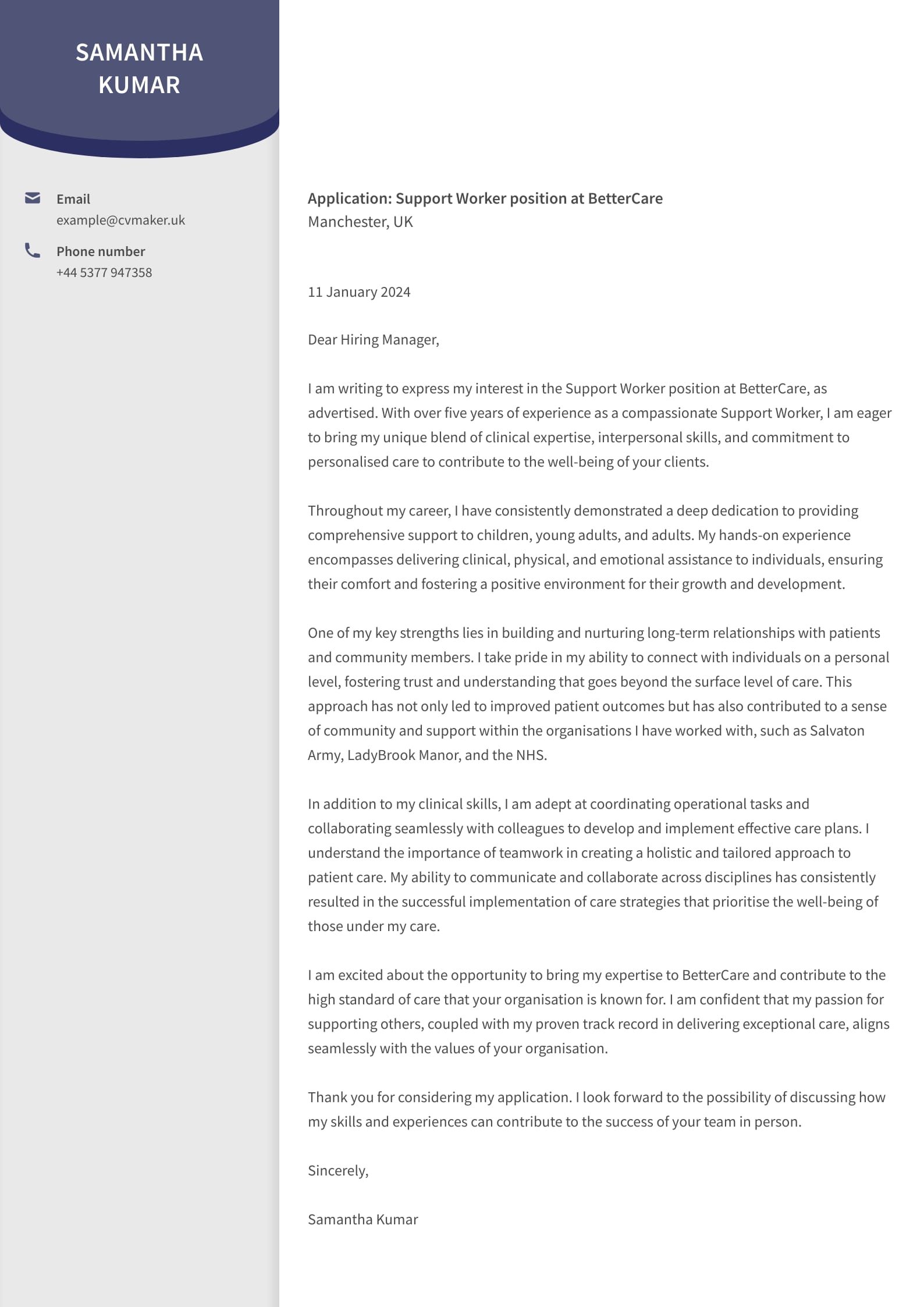
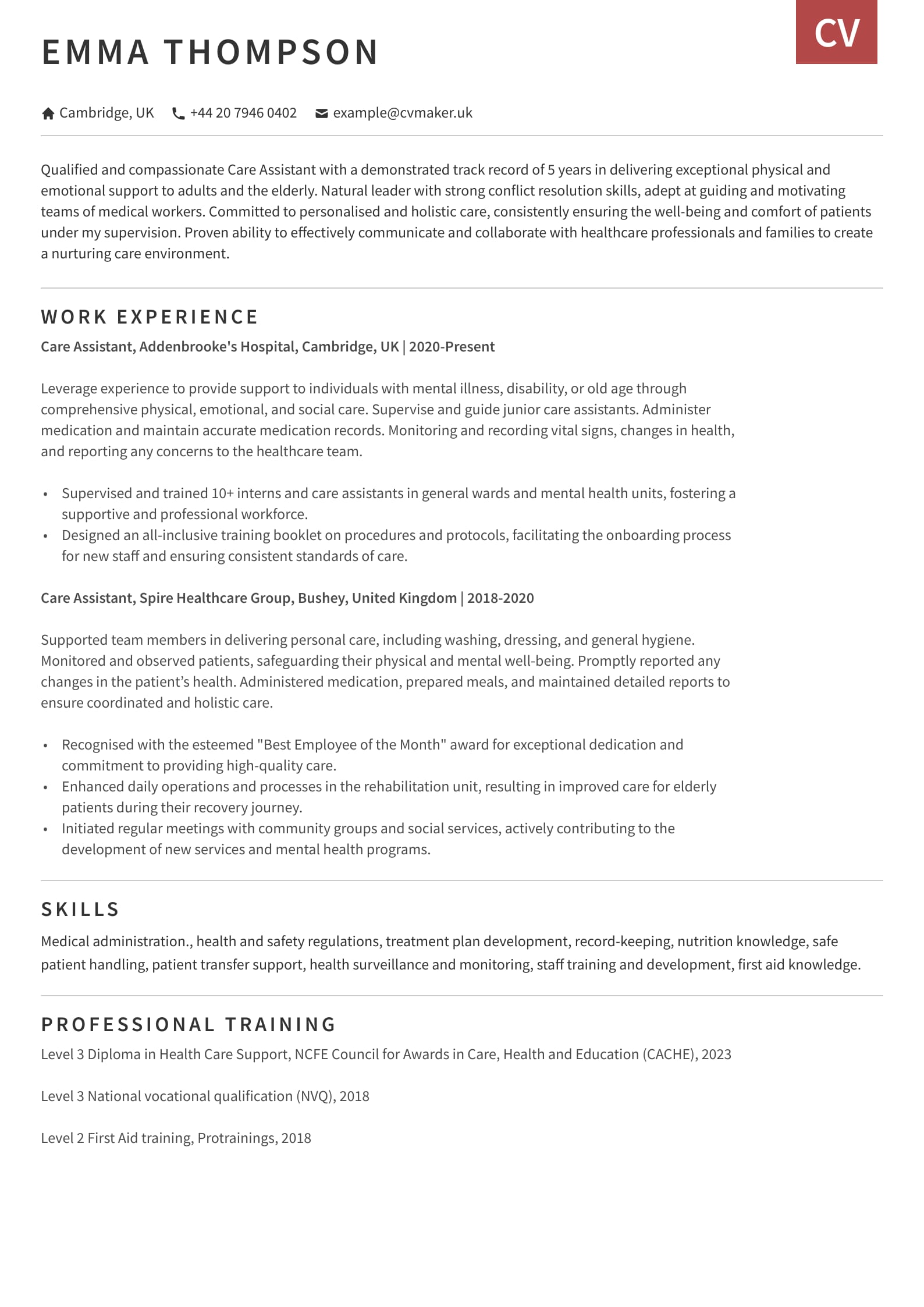
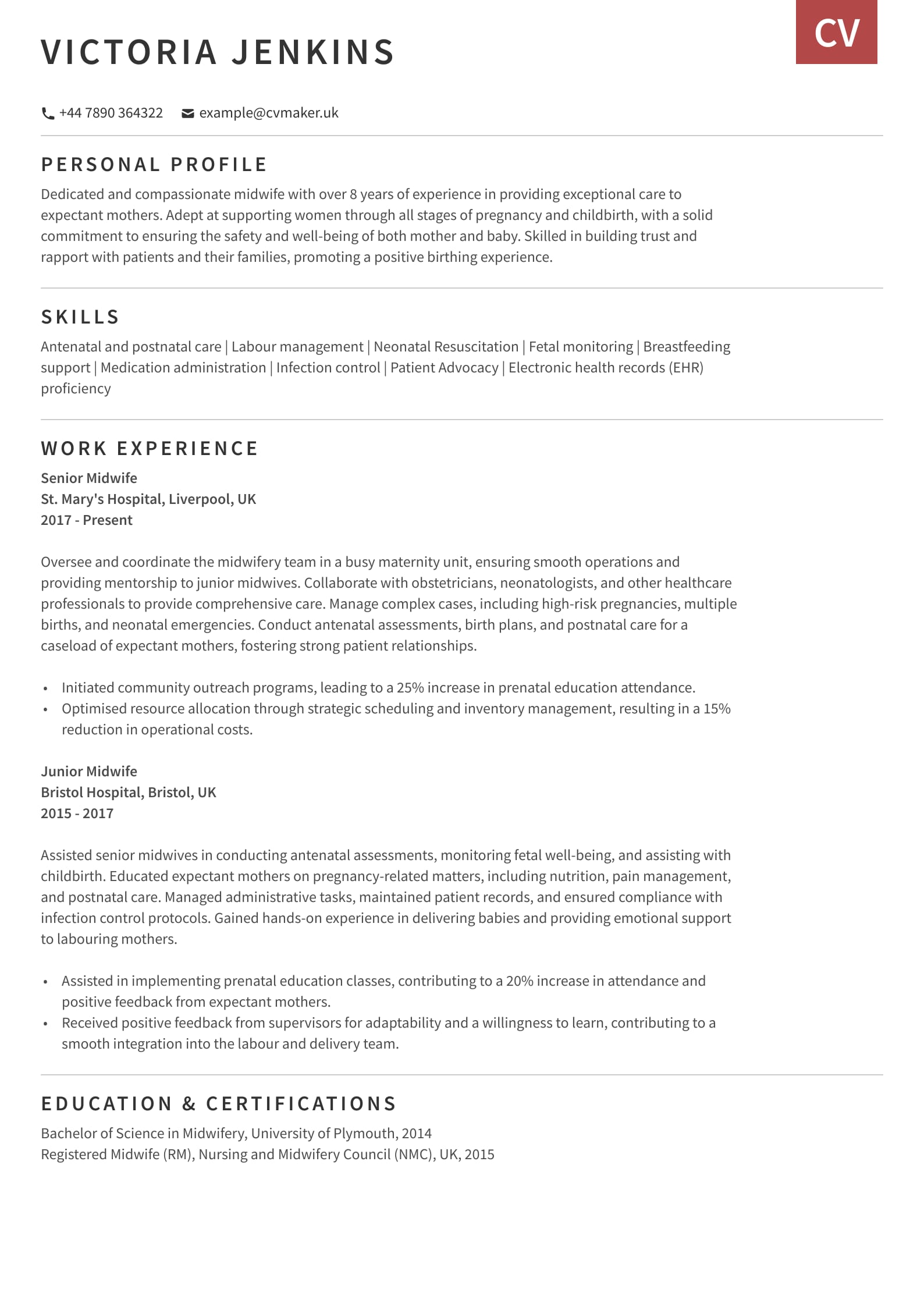
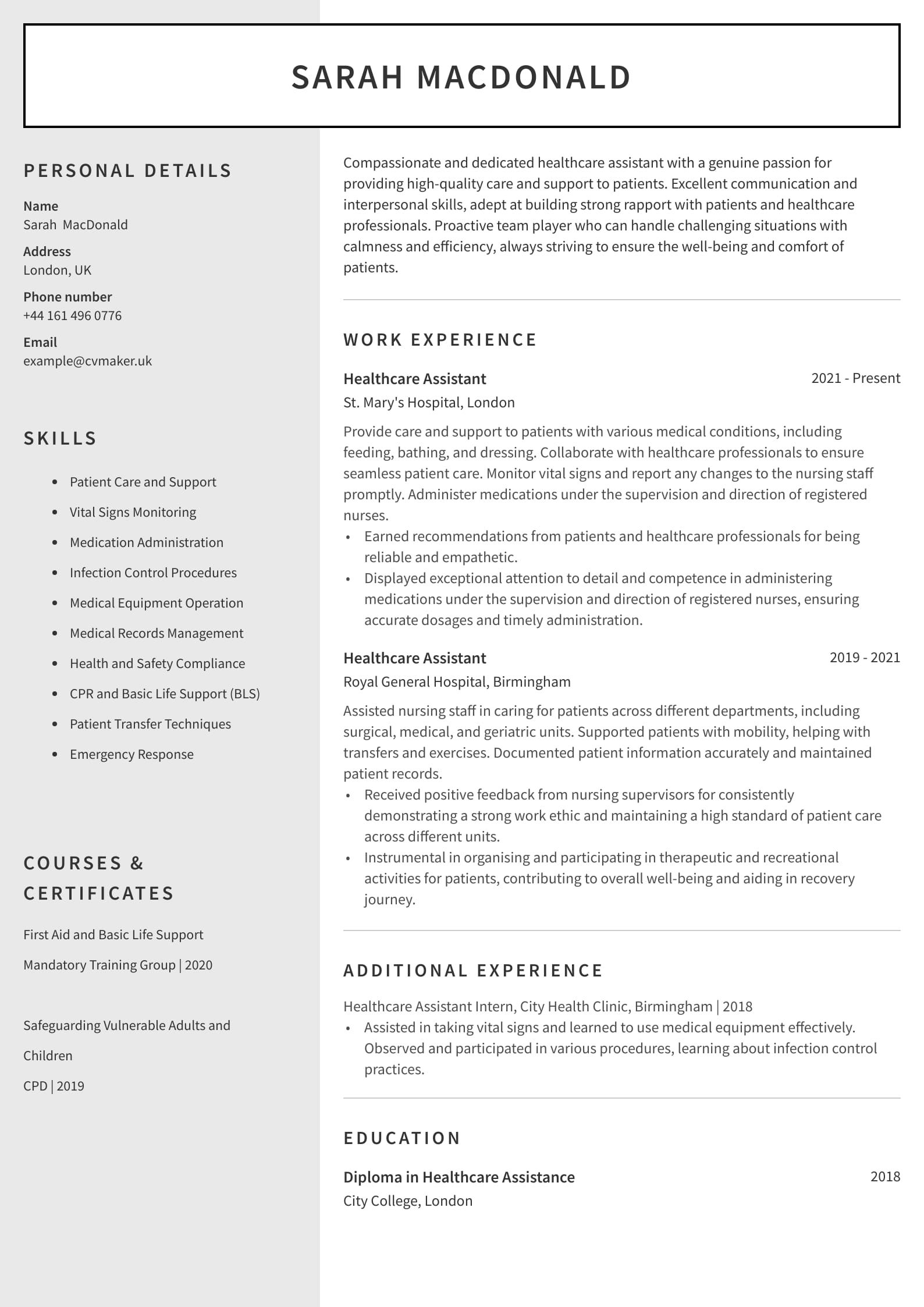


)

)
